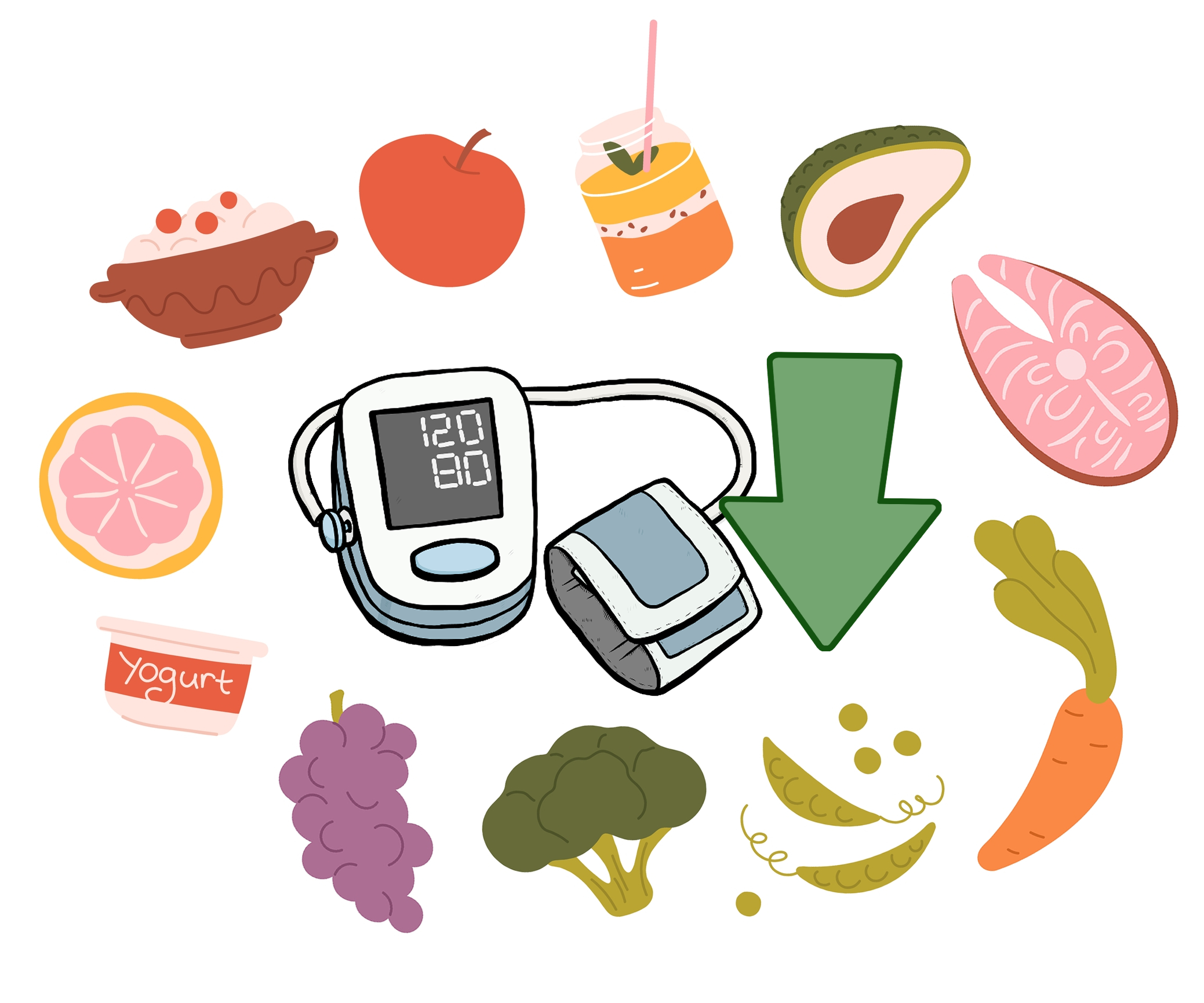The 2017 American College of Cardiology (ACC) and American Heart Association (AHA) hypertension guidelines recommend a heart-healthy diet as it will help people with elevated or high blood pressure (>120/80 mm Hg) meet their weight goals.[Strong Recommendation (Level A)].1 Adopting a healthy diet can result in a significant blood pressure reduction.1-3 In normotensive patients, systolic blood pressure is reduced by about 3 mm Hg and in hypertensives by about 11 mm Hg.
Other dietary steps recommended in the guidelines are reduction of dietary sodium and increased potassium consumption.1 Adults should ultimately aim for less than 1,500 mg/day of sodium in their diet but at a minimum should reduce their intake by at least 1,000 mg/day. Reducing dietary sodium can result in about a 5 mm Hg reduction in systolic blood pressure.1,4-6 Increasing dietary potassium to between 3,500 to 5,000 mg/d can lower systolic blood pressure by about 4 – 5 mm Hg.1,7
The DASH (Dietary Approaches to Stop Hypertension) diet is an example of a well-studied heart-healthy diet.1 It features a diet rich in vegetables, fruits, whole grains, and low-fat dairy products. A heart-healthy diet also reduces the amount of saturated fat and total fat consumption. The 2017 ACC/AHA guidelines recommend these sources for information about the DASH eating plan:
Studies
The PREMIER clinical trial of 810 hypertensive adults (mean [SD] age, 50 [8.9] years) studied the effect of behavioral and dietary interventions on blood pressure versus just advice for 6 months.2 The trial randomized the patients into three arms: an “established” group which employed recommended behavioral intervention only (n=268), an “established plus DASH” group (n=269), and an “advice only” group (n=273). Systolic BP decrease (mean [SD]) from baseline at six months for the “established plus DASH” arm was 11.1 (9.9) mm Hg, 10.5 (10.1) mm Hg for the established group, and 6.6 (9.2) mm Hg in the advice only arm. A significant number of people reached optimal blood pressure (<120 mm Hg systolic and <80 mm Hg diastolic) in all groups, but the groups with intervention had higher rates of people in the optimal blood pressure range. For the established plus DASH group, 35% reached optimal BP (p<0.001 compared with the advice only group; p=0.24 compared with the established group). 30% of the established group (p<.005 compared with the advice only group) and 19% of the advice only group reached optimal BP.
A 2016 systematic review and meta-analysis of 24 randomized controlled trials of six month duration or longer (n=23,858 overweight or obese adults, age 34 – 67 years) evaluated the effect of a variety of dietary interventions and their estimated aggregate effects on blood pressure.10 An analysis of studies grouped by similar diets found that the DASH diet (four trials, five comparison groups) resulted in the largest reduction in blood pressure with −7.62 mm Hg (95% confidence interval [CI] [-9.95 – -5.29]) for systolic and −4.22 mm Hg (95% CI [-5.87 – -2.57]) for diastolic. Next most beneficial diets were a low-calorie diet with blood pressure reductions of -3.18 mm Hg (95% CI [-4.24 – -2.11]) systolic and -1.28 mm Hg (95% CI [-1.87 – -0.69]) diastolic and a low sodium, high potassium diet with a -3.14 mm Hg (95% CI [-6.27 – -0.02]) systolic and -2.01 mm Hg (95% CI [-3.40 – -0.62]) diastolic. A low sodium diet resulted in blood pressure reductions of −2.06 mm Hg (95% CI [-3.50 – -0.63]) for systolic and −1.30 mm Hg (95% CI [-2.37 – -0.23]) for diastolic. Ten of the trials included only hypertensive participants (≥140/80) and these participants had significantly greater net blood pressure reductions than the trials of normotensive people.
Healthy Lifestyle Promotion by Doctors
Doctors can have an impact on patients’ adoption and adherence to weight loss goals with discussion.11,12 A 2010 meta-analysis of 74 trials found that cognitive-behavioral strategies can significantly help adults be successful at weight loss and maintaining healthy eating and activity habits.12 Goal setting, regular follow-up contact, check-ins, and self-monitoring all have strong evidence from randomized controlled trials that they promote behavior change.
References
- Whelton PK, Carey RM, Aronow WS, et al. 2017 ACC/AHA/AAPA/ABC/ACPM/AGS/APhA/ASH/ASPC/NMA/PCNA guideline for the prevention, detection, evaluation, and management of high blood pressure in adults: executive summary: a report of the American College of Cardiology/American Heart Association Task Force on Clinical Practice Guidelines. Hypertension 2017.
- Appel LJ, Champagne CM, Harsha DW, et al. Effects of comprehensive lifestyle modification on blood pressure control: main results of the PREMIER clinical trial. JAMA 2003; 289 (16): 2083-2093.
- Appel LJ, Moore TJ, Obarzanek E, et al. A clinical trial of the effects of dietary patterns on blood pressure. DASH Collaborative Research Group. N Engl J Med 1997; 336 (16): 1117-1124.
- Aburto NJ, Ziolkovska A, Hooper L, Elliott P, Cappuccio FP, Meerpohl JJ. Effect of lower sodium intake on health: systematic review and meta-analyses. BMJ 2013; 346: f1326.
- He FJ, Li J, Macgregor GA. Effect of longer term modest salt reduction on blood pressure: Cochrane systematic review and meta-analysis of randomised trials. BMJ 2013; 346: f1325.
- Sacks FM, Svetkey LP, Vollmer WM, et al. Effects on blood pressure of reduced dietary sodium and the Dietary Approaches to Stop Hypertension (DASH) diet. DASH-Sodium Collaborative Research Group. N Engl J Med 2001; 344 (1): 3-10.
- Whelton PK, He J, Cutler JA, et al. Effects of oral potassium on blood pressure. Meta-analysis of randomized controlled clinical trials. JAMA 1997; 277 (20): 1624-1632.
- National Heart, Lung, and Blood Institute. Your guide to lowering your blood pressure with DASH--how do I make the DASH? https://www.nhlbi.nih.gov/health/resources/heart/hbp-dash-how-to. Accessed April 29, 2018.
- The DASH Diet Eating Plan. Top 10 DASH diet tips. http://dashdiet.org/dash_diet_tips.asp. Accessed April 29, 2018.
- Gay HC, Rao SG, Vaccarino V, Ali MK. Effects of different dietary interventions on blood pressure: systematic review and meta-analysis of randomized controlled trials. Hypertension 2016; 67 (4): 733-739.
- Pool AC, Kraschnewski JL, Cover LA, et al. The impact of physician weight discussion on weight loss in US adults. Obes Res Clin Pract 2014; 8 (2): e131-139.
- Artinian NT, Fletcher GF, Mozaffarian D, et al. Interventions to promote physical activity and dietary lifestyle changes for cardiovascular risk factor reduction in adults: a scientific statement from the American Heart Association. Circulation 2010; 122 (4): 406-441.


.png)

